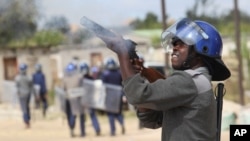Zimbabwe will pay July salaries for the army on Monday, more than a week late, but teachers will only receive their wages next month, a union official said, as
the government grapples with an acute currency shortage.
President Robert Mugabe's government is facing its biggest financial squeeze since it dumped its own hyperinflation-hit currency in 2009 and adopted the U.S. dollar.
Continued salary delays could fuel political tensions in the troubled southern African nation, which has been hit by drought, a drop in mineral prices and chronic cash shortages — all factors behind this month's protests against 92-year-old Mugabe.
"We have been informed of the new pay dates by the government today," Cecilia Alexander, chairwoman of the Apex Council civil service union, told Reuters.
"The correct thing is to pay the workers within the month they have worked but we appreciate that the period of delay has been reduced," said Alexander, referring to the three-week delay in the June pay-check for most government workers.
A copy of a government circular to unions seen by Reuters showed that army and air force officers - who are normally paid on the 14th of every month - will receive their dues on July 25.
Nurses and doctors will now be paid on July 27 and the police on July 29 but teachers, who make the largest number of state employees, will only receive their checks on August 2.
Without balance of payments support or funding from its traditional Western backers, Harare lives from hand to mouth, spending 82 percent of its national budget on public sector worker salaries.
A "stay away" protest movement led by activist pastor Evan Mawarire shut down most businesses, government offices, schools and hospitals for a day this month in the biggest act of public defiance against Mugabe in a decade.
Mawarire, who rallied followers under his #ThisFlag Twitter hashtag, makes an unlikely adversary to Mugabe, who has seen off foes from apartheid assassins and union leaders to Tony Blair and the IMF over his 36 years in power.





